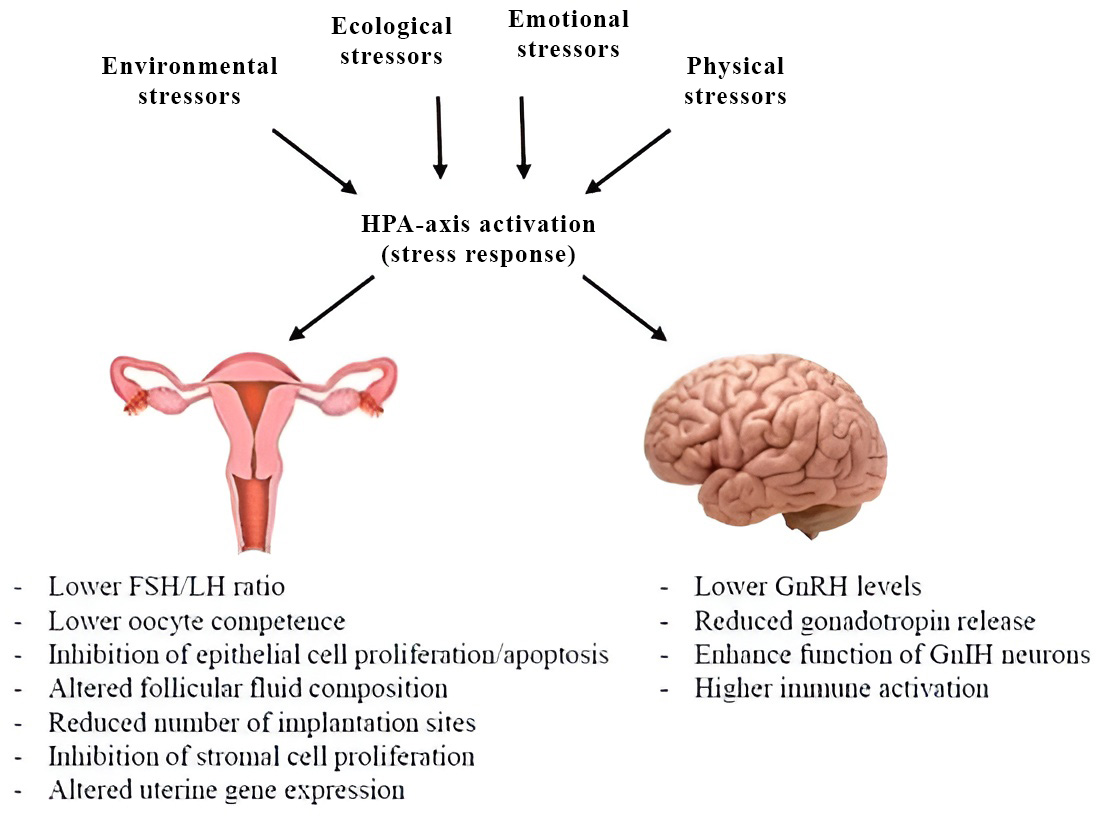STRESS AND INFERTILITY

In the current world, 1 in every 6 couple face infertility issues. Infertility can affect our lives extensively by affecting our relationship with friends and family, damage couple’s relationship, create financial troubles etc., Research has shown that women with infertility share similar level of anxiety and depression as women with HIV, heart disease and cancer.
Does stress cause infertility?
There have been many debates over the years about the association between stress and infertility. Even though, definitive relationship between stress and infertility is still being researched, we know that stress affects a women’s ability to get pregnant. Research has shown that
- Women with depression are twice likely to have infertility issues than women who are not depressed
- Stress decreases pregnancy rate in women undergoing IVF
- Anxiety in women lengthens time required to achieve pregnancy
How stress causes infertility?
Stress is a difficult criterion to investigate as it is a subjective. What is stressful for one person could be less stressful for other. However, Cortisol levels are elevated in stressful conditions and studies have shown that long term systemic cortisol levels may influence fertility treatment outcomes. There could be many possible mechanism, some of the following are noteworthy,
1. There are two main pathways which can be affected by stress, which are
a. HPA-HPG axis (Hypothalamo-Pituitary- Adrenal and Hypothalamo-Pituitary-Gonadal axis). Cortisol which is produced in response to a stressful situation could be associated with decreased likelihood of pregnancy. It affects this HPA-HPG pathway at all the three levels as follows,
- At the level of hypothalamus by inhibiting the secretion GnRH
- At the level of Pituitary by interfering with GnRH induced LH production
- At the level of Gonads level by affecting the production sex steroid which is regulated by Gonadotropins produced by Pituitary gland.
Changes in cortisol release patterns mediates the down regulation of the HPG axis. Various stages of menstrual cycle exhibit different cortisol release patterns as a response to stress, which in turn affects hormonal profile during the critical stages of fertilization.

b. HPA - immune axis (Hypothalamo-Pituitary - Adrenal- immune system) The second pathway which is affected by cortisol released during stress is the immune pathway. Stress affects the production of mediators such as pro-inflammatory cytokines, tumour necrosis factor and natural killer cells activation which are associated with reproductive outcomes.
2. Effect of stress on oocyte fertilization:
studies have shown that stress alters the microenvironment in the ovary ultimately damaging oocyte. Oocytes from follicles which had high levels of cortisol in their follicular fluid were not fertilized than the ones which had low level of cortisol. This shows that high levels of stress hormones negatively affect the oocyte’s ability to become fertilized.
3. Stress impairs with optimal uterine response:
Studies on animals has shown that stress hormones (cortisol) affected normal uterine changes needed for implantation of the embryo by disrupting formation of receptive uterine conditions. Increased cortisol blocked oestrogen mediated epithelial cell proliferation of the endometrium which is one of the important components of receptive uterus for successful embryo implantation.
4. Stress affects couple relationship:

Infertility treatment, especially assisted reproductive techniques is a complex multifaceted process. Women with infertility have increased anxiety and depression than normal people. Both men and women undergoing IVF exhibit mood disorders as well. Additionally, stress affects couple’s sexual relationship.
How to handle stress?
Know about your condition
It is important for couple/individual who are undergoing infertility treatment to talk with their fertility consultant/ counsellor and know more about their condition and all the options available for their needs. To be informed about their treatment plan and also about the probability of success and failure, will help in reducing discontinuation IVF treatment due to depression.
Communication

It is crucial for patients to talk about their needs, difficulties and emotions with their partner and likewise allow him/her to do the same. Bottling up emotions/ anxiety will lead to depression which will negatively affect their progress in treatment plan.
Follow healthy lifestyle

Healthy eating, adequate sleep and regular exercise are basic factors to lead a healthy life. It is vital to keep a balance between work and personal life and adhere to healthy lifestyle practises.
Relaxation techniques

Undergoing fertility treatment in itself is a stressful situation. Hence it is all the more important to learn to handle stress in a positive way by doing any of the following
- Muscle relaxation techniques
- Deep breathing techniques
- Meditation
- Mindfulness and yoga are one of the forms of meditation which has shown to improve fertility outcome in some studies
Will stress management increase pregnancy
Studies have shown that stress management has a positive effect on IVF treatment results by undergoing relaxation techniques, coping skills, group support etc…and many such studies have analysed stress reduction and IVF outcomes. However, more research is needed to study in detail the molecular changes which occur as a result of stress and its effect on reproduction.
To know more about stress management and counseling in Assisted Reproductive Technology (ART), Join our comprehensive Fellowship program in Reproductive Medicine. Our specialized course equips eligible participants with advanced skills and insights into the intricate aspects of reproductive medicine, offering a focused understanding of stress's impact on fertility and holistic approaches to manage it effectively. Enhance your expertise in addressing the intersection of stress and infertility, empowering yourself with invaluable knowledge and strategies to optimize patient care and treatment outcomes in reproductive medicine. Elevate your practice and join us to make a meaningful difference in the lives of individuals navigating infertility challenges.
For more info, Visit : www.medlineacademics.com
